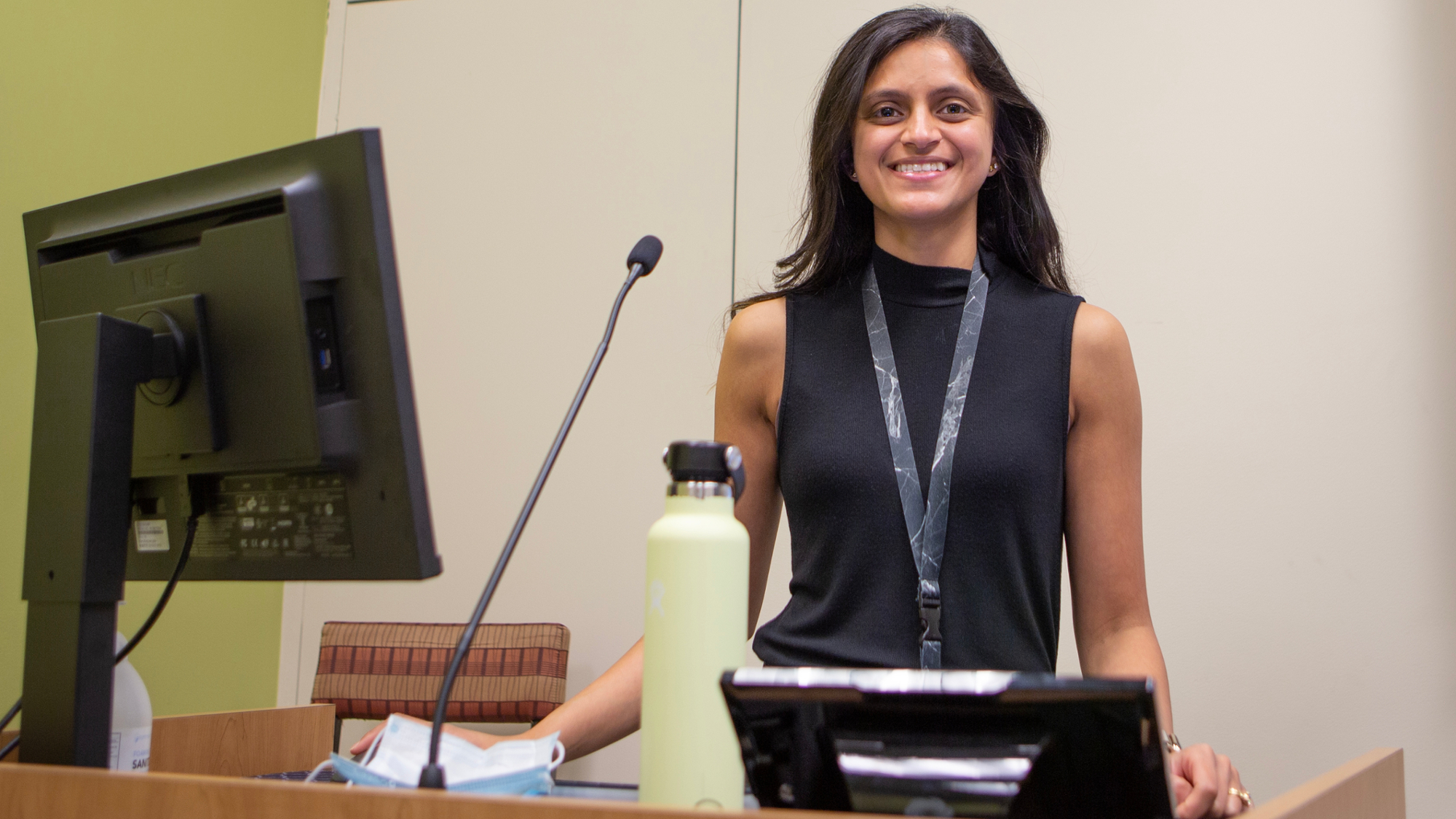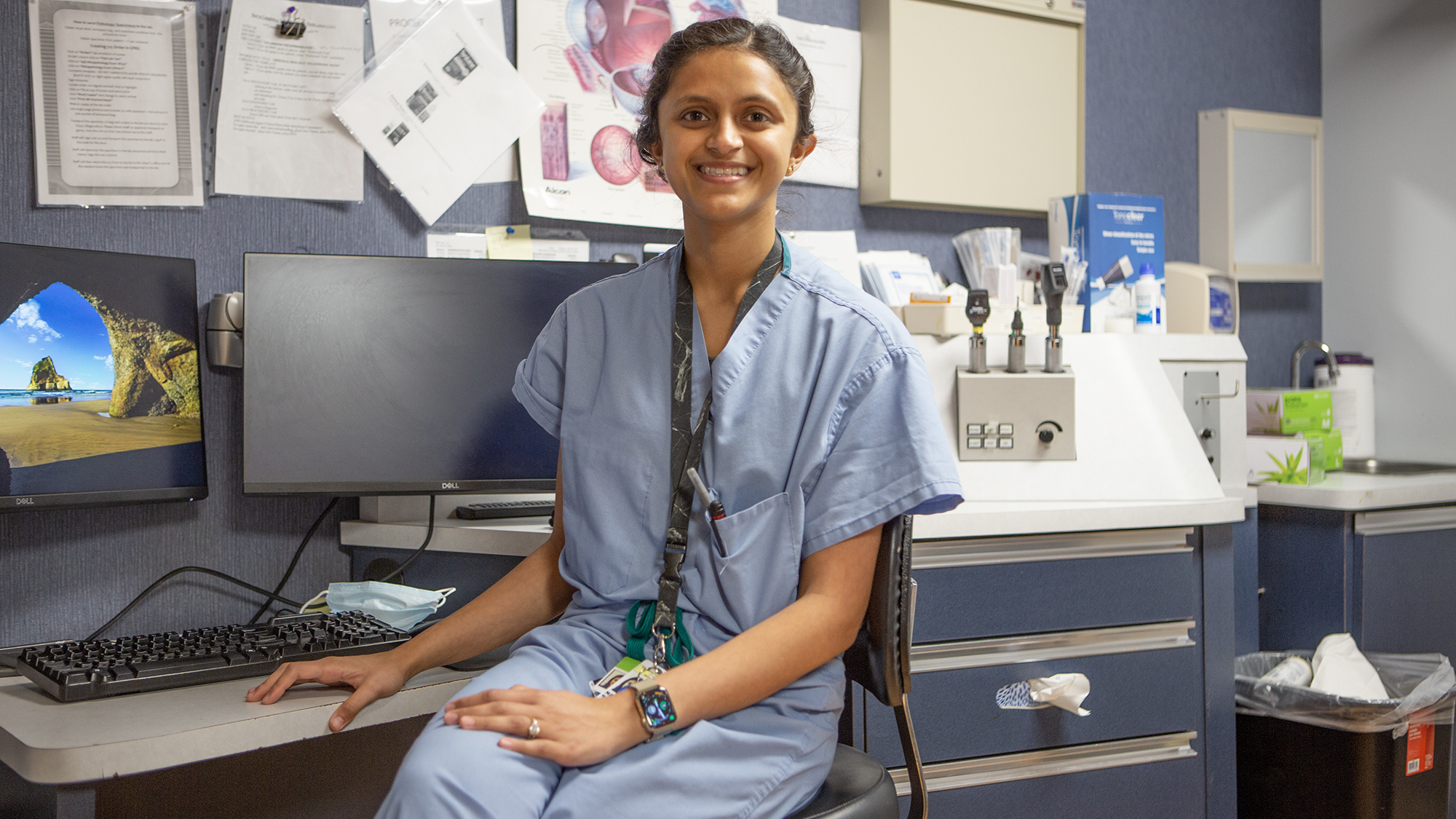
Every day, these ophthalmologists-in-training face challenges that never made it into a textbook. And they solve them.
When it came to handing out thank-you's for this occasion, Dr. Jeremy Jones was seriously hard-pressed.
A lot of the gratitude we experience during each rotation is front-loaded when we recruit,
says the EEC's residency education director. We know we are bringing in doctors who are as compassionate as they are smart. We just never know how they'll wow us.
But even Jones would agree that there's a special place in his heart for the chief resident -- that odd bird who is both a middle manager for a team of doctors-in-training and, well, every bit a doctor-in-training him or herself.
For the class of 2023, that chief resident is Maitri Mehta, a graduate of the Thomas Jefferson University School of Medicine. Now in her final months of residency, Dr. Mehta helped us to celebrate all ophthalmic residents by sharing a little bit of her own journey becoming one.
Why did you enter medicine?
Well, a lot of people go into medicine because they want to help others. And that was the biggest driver for me, too. It was also the opportunity to be a leader, and to take the responsibility that comes with that. I liked the idea that the medical decisions I made would affect people's lives. I also like working in a team, and medicine is very much a team sport. You are working with a team of others whose knowledge and opinions are important.
My father is a cardiologist, and my mom's an internal medicine doctor, so I grew up seeing exactly what a medical career entails. And I always saw it in the most positive light. My parents are just very much in love with what they do. When I listened to them talk over dinner, I didn't realize how much responsibility they had at work or how difficult it can be to go through medical training. They just loved medicine so much that it was very normal for them to be at work all day and then come home and still talk about medicine. They liked asking each other questions about the different things they saw each day in their own practices. They still do.
Why did you choose ophthalmology?
I started out thinking I wanted to go into cardiology. But you get introduced to a lot of things in med school and once I discovered ophthalmology, it just checked a lot more boxes. For one thing, I really like doing things with my hands – like crafts, baking, or cake decorating. And ophthalmology relies a lot on the same refined manual dexterity and control.
The eye is pretty resilient in some ways, but it's also, you know, pretty delicate. You have to be comfortable with that. Eyes are really small, and the tissues don't like to regenerate themselves. And the surgeries on the eyeball itself, involve working in a space less than three centimeters around.
That's the sort of challenge that suits me. I am drawn to ophthalmology because it's based around working with a high degree of precision on something that is really intricate -- and really important. It doesn't make me nervous to work on it. It's really intriguing to me.
I also like the primary care, long-term aspect of ophthalmology. You can be someone's eye doctor for their whole life. And that means you can really get integrated into a community. You can establish a continuity of care that's not always possible in other specialties.
If you weren't an ophthalmologist, what would you be?
I would probably be a pastry chef. I really, really like pastry.
When I was a little kid, my parents never bought cookies or anything like that. And they weren't into baking – I think our oven was in the basement. But I had a sweet tooth and I was always interested in food. I would sit in my piano teacher's den and watch The Food Network while I was waiting to take my own piano lessons.. Eventually, I was like, 'You know what, I'm just going to use that oven. I'm going to learn how to bake .' And I did.
It's still my number one hobby - the thing I will turn to when I have a couple of hours. I love to make birthday cakes for other people or treats to bring to work. Cream puffs are fun to make. They're not as hard as people think they are. My specialty is French macrons - the little sandwich cookies. They're cute. You can make so many different flavors. And when they turn out well, it just feels really good.
But they're really tricky. I've made them a bunch of times now, so I kind of have the process down. That's what I like about baking: there are certain prescribed steps; if you follow the steps, most of the time, it'll work out. Most things work like that.
What advice would you give a new ophthalmological resident?
Residency is a steep learning curve, so don't be so hard on yourself. Most of us in medicine are used to learning things pretty quickly and we are good at retaining things so we can apply them or use them on a test. That's a structure that we're all very familiar with.
But when you are a resident entering a specialty, like ophthalmology, you are introduced to a lot more in-depth information while you are working. All at once. You have to absorb a lot while you are applying it. And you won't get it all at once, which can make you question yourself. Don't let it.
It's normal to feel challenged by what you don't know. But it's not a reflection of your abilities. That's what residency is there for. Don't let it stop you. You will never have all the answers. Don't let the experience of learning defeat you.
What's next for you?
I will be completing my residency at Emory this spring and moving to Houston to join my husband who works in finance there. My plan is to do comprehensive ophthalmology, but I'm still interviewing. I'll probably join a practice rather than setting up my own shop because the [vision] community is very well-established in the city.
-Kathleen E. Moore


